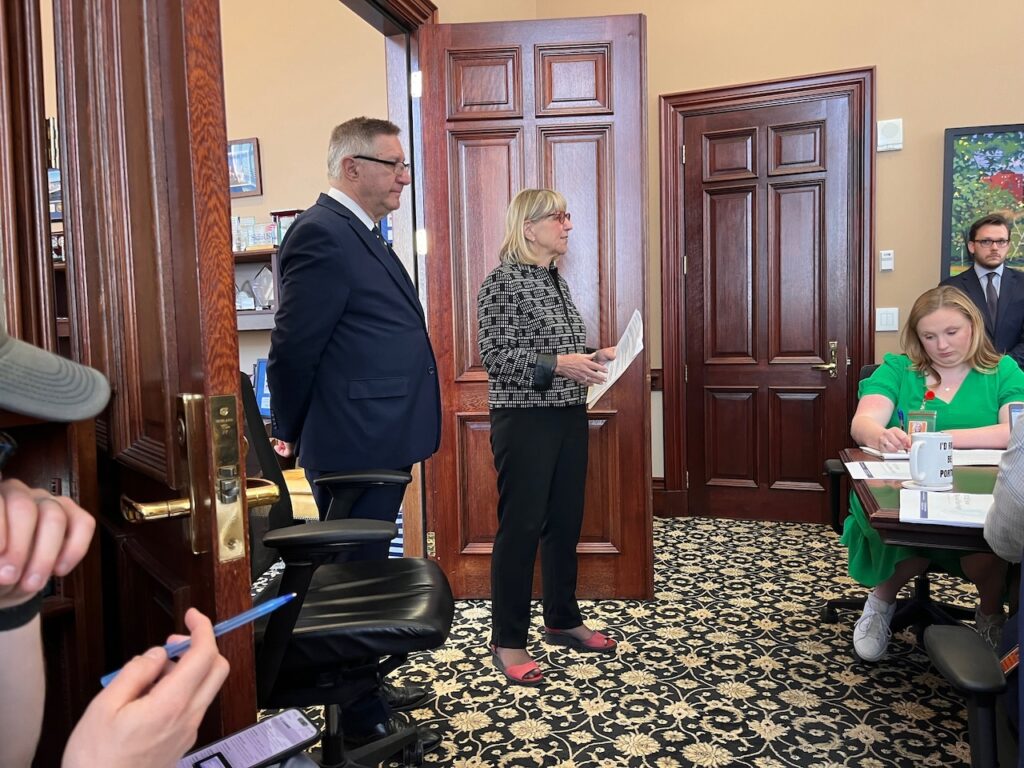People talk a lot about inflection points — and it’s always in the past tense. You rarely recognize them as they’re happening.
But if you were paying attention to Beacon Hill this week, you saw one in real-time and in the most unexpected and resolutely anodyne of places: The start of the Massachusetts Senate’s annual budget debate.
Ready? Here it is, courtesy of Senate Committee on Ways and Means Chairperson Michael Rodrigues, D-1st Bristol/Plymouth.
“Over the course of the last few months, we have witnessed firsthand how our federal partners have unleashed unprecedented amounts of uncertainty, unpredictability and volatility,” the South Coast lawmaker said Monday as the majority-Democrat chamber started debate on a $61.3 billion spending plan for the new fiscal year that starts July 1.
“In past turbulent times, the question we asked ourselves was, ‘How much help can we expect from our friends in D.C.?’ Yet today, we find ourselves in the unique position of asking, ‘How much is D.C. going to hurt us today?’” Rodriques mused, according to State House News Service.
The sentiment isn’t a new one. Elected and community leaders across the Bay State have been sounding the alarm for months about the impact that diminished federal funding will have on the state’s bottom line.
And a word about process: The Senate is expected to spend most of the week wading through more than 1,000 amendments to the budget proposal. Senators have been advised of a “potential” formal session on Thursday as well, the wire service reported
As a refresher, Massachusetts gets nearly $23 billion in funding from Washington every year, with around $16 billion of it pumped into the state’s operating budget, data show.
But spending cuts across the federal government that already have taken place, and those being eyed by Republicans on Capitol Hill — including Medicaid and hunger assistance — are expected to throw states’ economies into disarray.
And that doesn’t even count the hit that nonprofits and colleges and universities, all of them economic players, are taking this year.
Democratic Gov. Maura Healey, who will have a big say in the final shape of the spending plan that hits her desk, already has announced an executive branch hiring freeze because of the shaky funding picture.
Read More: These key public services won’t be hit by the state’s hiring freeze, Mass. Gov. Healey says
One more big tell about the changed political and economic topography?
While there’s not exactly emphatic Republican agreement about the Democrats’ spending priorities, there’s a clear-eyed recognition that the state is facing seismic forces this year that it has not seen before.
Here’s Senate Minority Leader Bruce E. Tarr, R-1st Essex/Middlesex:
“I dare say that while every budget is important and while every budget is a challenge, the consequences of our decisions with this budget are perhaps more intense than some of the recent budgets that we’ve dealt with,” Tarr said Monday during the customary GOP response.
The Gloucester lawmaker noted that he and his colleagues had faced uncertain times before, notably during the COVID-19 pandemic, State House News Service reported.
But, he allowed, “we always found a way to move forward to address the uncertainty and those difficult economic times.”
That makes it “imperative that we do so once again,” and while Rodriques pointed to one “element of uncertainty, there is another element. And that other element deals with the issue of what could be an economic downturn that could have significant consequences for the Commonwealth of Massachusetts.”
Tarr isn’t the only one thinking that way. Jim Rooney, the president and CEO of the influential Greater Boston Chamber of Commerce, had the same issues on his mind recently.
Massachusetts already was struggling with economic competitiveness and job creation issues before Trump returned to office in January, Rooney told WBZ-TV’s “Keller @Large” program last weekend.
“Now you layer on job-impacting types of federal policies like tariffs, like research funding, like immigration and that was going to be tough anyway,” Rooney said.
“And … if you look at where our jobs are, [with] high concentrations in life sciences and medicine … this is right in the gut of the Massachusetts economy,” he continued.
Those concerns are further underlined by new research by Mark Williams, a master lecturer in finance at Boston University, concluding that the Republican White House’s policies could result in billions of dollars in lost revenue and tens of thousands of job losses as early as next year.
That’s because, compared to other states, the Bay State’s economy “disproportionately” depends on such sectors as life sciences, higher education, trade and tourism, Williams said. All of those already have been — or will be hit — by Trump’s economic policies.
Which brings us back to Rodriques and the admittedly limited palette that he and his fellow lawmakers, along with Healey, have to work with this budget season.
The Senate’s top budget-writer has ruled out dipping into the state’s Rainy Day Fund to backfill any lost federal money. Healey has repeatedly said the state doesn’t have the cash to do it on its own.
And over in the House, which passed its $61.4 billion budget proposal earlier this month, House Committee on Ways and Means Chairperson Aaron Michlewitz, D-3rd Suffolk, has been similarly circumspect.
The fiscal picture could be clarified as the June 30 deadline to approve a new spending plan approaches — and as the two chambers reconcile the differences between the $62 billion budget plan backed by Healey and their respective proposals. Spending cuts appear to be decidedly off the table.
Right now, the only certain thing is the budget deadline, and lawmakers routinely blow through that. So it’s good to know we can count on at least one thing.


